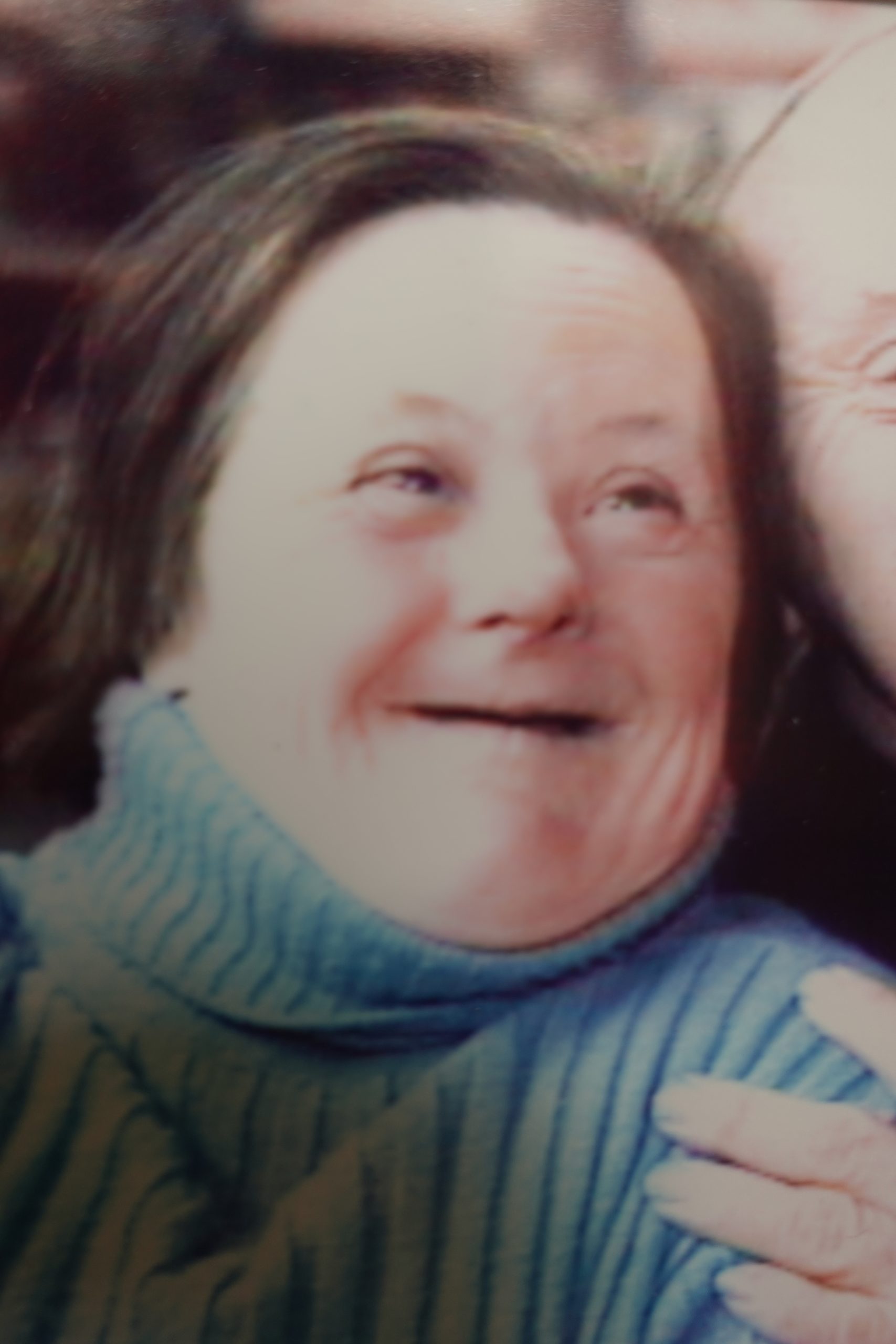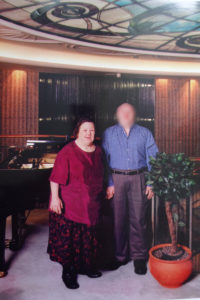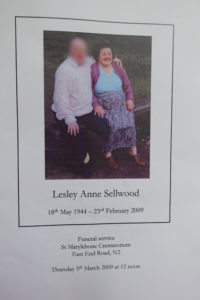Lesley Anne Sellwood
1944 – 2009
Written by her sister Hilary
 My sister Lesley was born when I was three-and-a-half and living in north London. Our mother knew immediately that there was something different with her baby, but no medical professional was prepared to enlighten her. After some months, and concerned about the shape of her baby’s eyes, she managed to persuade her GP to refer her to Great Ormond Street Hospital. There she learned for the first time that Lesley had Down’s syndrome.
My sister Lesley was born when I was three-and-a-half and living in north London. Our mother knew immediately that there was something different with her baby, but no medical professional was prepared to enlighten her. After some months, and concerned about the shape of her baby’s eyes, she managed to persuade her GP to refer her to Great Ormond Street Hospital. There she learned for the first time that Lesley had Down’s syndrome.
A third girl was born in 1946, three months before Lesley’s second birthday. Lesley’s development was slow and she was very wilful which meant considerable strain for our mother. If she didn’t want to cross the road, for example, she would sit down in the middle while her mother tried to get her to her feet as well as manoeuvre a pram safely and avoid passing traffic. I recall another scary incident. Nappies were drying on a clothes horse in front of the living room fire. Lesley decided to take them down and throw them on the flames. Our mother managed to rescue the situation before the need to involve the fire brigade. That would have been especially embarrassing as our father was serving in the Auxiliary Fire Service!
Our mother had been an only child and was hoping to have a large family herself. She was obviously struggling and was persuaded by her husband and the GP that it would be a good idea if Lesley were sent away for six months’ respite. She went to a retired nurse in Bristol who found it very difficult to cope with Lesley. Her parents were not allowed to visit, such was the wisdom of the time, and it is hardly surprising that Lesley didn’t settle there. After this experiment, the decision was made that she should go away permanently. Responsibility for her upbringing was transferred from her parents to Haringey Council. For the next thirty-odd years she was in the care of Harperbury Hospital, one of the major institutions for people with mental health problems.
 Lesley learned to read and write, achieving the standard expected of an eight-year-old, and flourished in their care. Her interests were knitting and rug making. Above all she was incredibly proud of her ‘large family’. It always surprised me that she should have such strong feelings for a family which she could have no recollection of having lived with. As her siblings married and had children, she would remember all their names and to which couple each child belonged. Our parents would visit, taking her out to St Albans to have tea and to shop for new clothes. Once I had passed my driving test, I would drive my mother there and was amazed by the standard of the nativity play and carol concert I witnessed on one such visit.
Lesley learned to read and write, achieving the standard expected of an eight-year-old, and flourished in their care. Her interests were knitting and rug making. Above all she was incredibly proud of her ‘large family’. It always surprised me that she should have such strong feelings for a family which she could have no recollection of having lived with. As her siblings married and had children, she would remember all their names and to which couple each child belonged. Our parents would visit, taking her out to St Albans to have tea and to shop for new clothes. Once I had passed my driving test, I would drive my mother there and was amazed by the standard of the nativity play and carol concert I witnessed on one such visit.
Our father had struggled to come to terms with Lesley’s birth. Only people who were around at the time of her birth knew of Lesley’s existence. This included keeping her siblings in the dark. It was explained to me that no one needed to know about her, she was unlikely to live beyond her early teens, and in any case other people wouldn’t understand. I hated not being able to talk about her to my friends and family. By the time antibiotics were changing the probability of living longer, my father decided his other children should be told about Lesley as they reached their majority. Each of them reacted somewhat differently. My sister was the first to know and the news was broken just as she was to start her nursing training. She greeted the revelation with some anger as she would have liked to have got to know this missing member of the family. She was taken to meet Lesley almost immediately and was saddened by being unable to feel any kindred spirit. Lesley didn’t look like anyone else in the family and she couldn’t summon up any love for her at that time. A couple of years later our two brothers were let into the secret about the same time as each other. The elder one was about to leave the country on a gap year and decided, since he hadn’t known anything about her before that, it could stay that way and had no interest in meeting her at all. The younger was about to start his medical training. He became interested in how Down’s syndrome came about and we learned a lot about chromosomes from him. He lived a good distance from London but we arranged to meet up with Lesley on a few occasions.
 Had it not been for the government’s decision to empty the institutions in favour of ‘care in the community’, I guess Lesley would have ended her days at Harperbury. As it was, she was one of the first to leave. She and three others spent a year in a house in the grounds, learning what it means to be independent. She learned to handle money, shop and account for the change, to undertake basic cooking skills, clothes washing and house cleaning as well as personal care. At the end of the year, she and her fellow residents were discharged into a hostel, with on-site carers. She spent nine years there, having her own room for which she had total responsibility, with a key so it could be kept locked when she was not in. She had a part-time job at Remploy and attended church regularly. The local community were very supportive and would turn up for birthdays or other celebrations. My sister and I would visit with our children, taking her out for walks in the park. Everyone we met would be told, “This is my sister” and “Aren’t I clever?” She was obviously very proud of us. With hindsight, residence in the hostel was an ideal arrangement under which Lesley thrived.
Had it not been for the government’s decision to empty the institutions in favour of ‘care in the community’, I guess Lesley would have ended her days at Harperbury. As it was, she was one of the first to leave. She and three others spent a year in a house in the grounds, learning what it means to be independent. She learned to handle money, shop and account for the change, to undertake basic cooking skills, clothes washing and house cleaning as well as personal care. At the end of the year, she and her fellow residents were discharged into a hostel, with on-site carers. She spent nine years there, having her own room for which she had total responsibility, with a key so it could be kept locked when she was not in. She had a part-time job at Remploy and attended church regularly. The local community were very supportive and would turn up for birthdays or other celebrations. My sister and I would visit with our children, taking her out for walks in the park. Everyone we met would be told, “This is my sister” and “Aren’t I clever?” She was obviously very proud of us. With hindsight, residence in the hostel was an ideal arrangement under which Lesley thrived.
Pressure was coming for clearing the institutions. Lesley and three others were moved on, under the care of HAIL (Haringey Association for Independent Living). She shared a house with Carol and two men, Keith and Andrew. It wasn’t long before Lesley transferred her affections from Keith to Andrew, who had hitherto been Carol’s boyfriend. Fights ensued and the authorities had to make other arrangements. A flat was found in a former almshouse for Lesley and Andrew (who also had Down’s syndrome) to live together…..
Continued: You can read the rest of Lesley’s story here.
